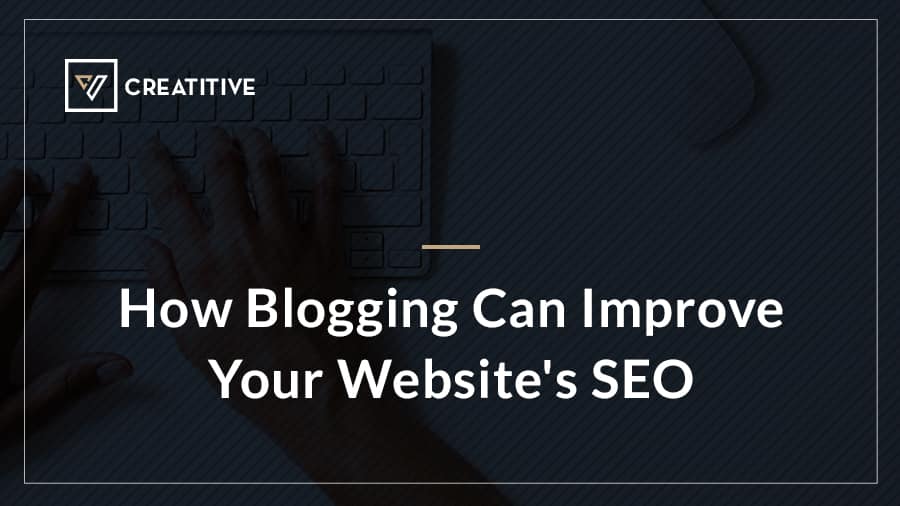

What’s Blogging?
At its core, blogging is about sharing your thoughts, ideas, or expertise with your audience. From a personal blog where you might talk about your travel adventures to a business blog discussing industry trends, blogging is as diverse as the people in it. But beyond that, how does blogging help SEO and your overall marketing efforts?
3 Benefits of Blogging for Your Website Search Engine Optimization
#1 It Improves Search Engine Rankings
Ever wonder how search engines like Google decide what content shows up first for specific search queries? They love fresh, relevant content, and that’s exactly what consistent blogging provides. Every time you create a blog post, you add another indexed page to your website, which is another opportunity to show up in search engines and drive traffic to your site in organic search.
Google loves fresh, relevant content, and that’s exactly what consistent blogging provides
#2 Long-Tail Keywords
While you might have specific target keywords you’re trying to rank for, there’s also a lot of value in targeting long-tail keywords. These are more specific keyword phrases that visitors are more likely to use when they’re closer to the point of purchase or when using voice search. Blogging helps SEO by allowing you to incorporate these long-tail keywords into your content naturally, improving your visibility on search engines.
Blogging allows you to incorporate long-tail keywords into your content naturally, improving your visibility on search engines.
#3 Internal and External Links
Blog posts give you the perfect platform to incorporate internal links, helping to boost your SEO efforts by keeping consumers on your site longer. They also give others the opportunity to link back to your content, creating valuable external links.
A blog post is the perfect spot to incorporate internal links which translates into keeping consumers on your website longer.
3 Benefits of Blogging for Your Marketing Efforts
#1 A Blog Post Increases Organic Traffic
By consistently blogging and optimizing blog posts, you’re able to boost your organic traffic significantly. More traffic translates to more potential customers, improving the return on your digital marketing investment.
#2 Content Marketing
A well-maintained blog can serve as the cornerstone of your content marketing strategy. Every blog post is a new piece of content that can be shared on social media, used to engage with your audience and build your brand’s authority.
#3 Lead Generation
Every blog post can also be a lead generator. By providing quality content that your audience finds valuable, you can guide them toward your product pages or service pages, converting readers into leads and leads into customers.





Content Marketing
Start your digital journey today!
3 Benefits of Blogging for Your Brand
#1 Establish Authority on Search Engines
A well-crafted blog article allows you to demonstrate your expertise in your field. By providing valuable insights and engaging content, you build trust with your audience, establishing your brand as a go-to resource.
#2 Brand Storytelling
Blogging enables you to weave a compelling narrative about your brand. It’s a platform where you can share your brand’s journey, values, and vision, fostering a deeper connection with your audience.
#3 Blogging Boosts Brand Awareness
By incorporating SEO strategies, like targeted keywords and internal link building, into your blog posts, your content is more likely to appear in search engine results pages (SERPs). This increases your brand visibility and, in turn, enhances brand awareness and recognition.
3 Benefits of Blogging for Your Business
#1 Improved SEO
SEO isn’t just about getting more traffic; it’s about getting the right traffic. By targeting the right keywords and consistently blogging, your site rank will improve, bringing in more organic traffic.
#2 Increased ROI
Each blog post is a long-term investment. It will continue to bring in new traffic and leads long after it’s been published. The more quality content you create, the more organic traffic and leads you’ll get, improving your overall ROI.
#3 Customer Engagement
Blogs provide a platform for your customers to engage with your brand. Comments and shares can give you valuable insights into your customer’s needs and preferences, allowing you to tailor your offerings and content strategy. This two-way interaction can help foster a sense of community and loyalty towards your brand.
5-Step Guide to Start Your Blog
Perhaps you’re now convinced of the SEO benefits of blogging, but you’re unsure where to start. Don’t worry; we’ve got you covered. Here’s a brief guide to getting your blog off the ground.
- Keyword Research: Your blog’s success starts with finding the right keywords. SEO tools can help you identify the keywords your target audience is using in their search queries. Incorporating these keywords naturally into your blog posts will help boost your visibility on search engines.
- Craft Engaging Content: Creating content that offers real value to your audience is key. Every blog post should be crafted with your audience’s interests and needs in mind. A great post isn’t just keyword-stuffed but offers actionable insights or solutions.
- Optimize Your Blog Posts: Optimizing your blog content isn’t just about incorporating keywords. It also involves using meta descriptions, optimizing images (image optimization, including image alt text), ensuring quick page speed, and creating relevant content that answers your audience’s questions.
- Create a Content Schedule: Consistency is key in blogging. Regularly updating your blog with fresh content tells Google and other search engines that your site is current and relevant, improving your SEO.
- Promote Your Blog: Don’t just publish your blog post and forget about it. Share it on your social media channels, email it to your subscribers, and use SEO strategies to help your blog reach more people.
Remember, it’s not just about creating a single blog post but maintaining a consistent blog that regularly provides value to your audience. This will not only boost your SEO but also establish your brand as an authority in your field, encourage customer engagement, and ultimately drive your ROI.
Creating a successful blog might seem daunting, but with the right approach and commitment, it’s an achievable goal. Remember, each blog post you create is an investment in your business. So start crafting your quality content today and watch as the benefits roll in.
If you need further help with blogging, SEO, or content marketing, don’t hesitate to reach out. We’re here to help you make the most of your digital presence and guide you on the path to success.





Blogging Strategy
Start your digital journey today!
How to Assess Your Blogging Performance
Assessing your blogging performance is crucial to understanding its impact on your SEO strategy and overall digital marketing efforts.
Here’s a step-by-step guide on how to do it:
Google Analytics
Google’s free tool is incredibly valuable for assessing your blog’s performance. It offers insights into key metrics such as page views, unique visitors, bounce rate, and average time on page. You can also monitor which blog posts are generating the most traffic, helping you understand what content resonates with your audience.
SEO Metrics
Look at organic traffic and rankings for your target keywords. Are your blog posts appearing in search engine results pages (SERPs)? Are they attracting more organic traffic over time? Tools like SEMrush or Ahrefs can help you track these metrics.
Social Shares
If your blog posts are shared across social media platforms, it’s a good sign they’re resonating with your audience. There are various tools online that can help you track social shares.
Engagement
Comments, likes, and shares are direct indicators of how engaged your audience is with your content. More engagement usually signals high-quality, relevant content.
Conversion Rate
Are your blog posts driving actions? This could be a product purchase, newsletter sign-up, or a download of a free resource. Google Analytics can help you track conversions and understand the ROI of your blogging efforts.
Backlinks
High-quality external links to your blog posts can significantly boost your SEO. Tools like Moz or Ahrefs can help you track who is linking to your content.
Keyword Rankings
Use SEO tools to monitor how your blog posts rank for target keywords over time. Are your SEO efforts leading to improved visibility in SERPs?
Loading Speed
Page speed is a crucial SEO factor. If your blog pages take too long to load, it can affect your bounce rate and SEO negatively. Tools like Google’s PageSpeed Insights can help assess your page loading speed.
Well done, you can understand how your blog is performing, what’s working, and what areas might need improvement. Remember, blogging is a long-term strategy, and improvements may take time to show. Patience and consistency are key.
3 Indicators of SEO Over-Optimized Blog Posts
Over-optimization of your blog can hurt your SEO efforts as much as not optimizing it at all. Search engines, particularly Google, prioritize user experience and relevant, high-quality content. Here are three ways to identify if your blog is over-optimized:
#1 Keyword Stuffing
One of the telltale signs of over-optimization is keyword stuffing, where target keywords are excessively used throughout your blog content. While it’s important to include relevant keywords, doing so excessively can negatively impact readability and make your content seem spammy. Modern search engine algorithms can detect this and may penalize your site for it. A well-optimized blog post will incorporate keywords naturally and in a way that enhances the content.
#2 Overuse of Internal and External Links
While internal and external links are crucial for SEO, excessive linking can hurt your blog’s SEO performance. For instance, if every sentence contains a link, it can disrupt the reading experience and make the content feel spammy. Also, linking to low-quality or irrelevant sites can harm your SEO. Be strategic with your linking and ensure each link provides value to your readers.
#3 Non-relevant Meta Tags and Descriptions
If your blog’s meta tags and descriptions are filled with keywords but do not accurately describe the content of the blog post, this could be a sign of over-optimization. Meta descriptions and tags should provide a concise and accurate summary of your content to both readers and search engines.
In essence, the best approach to SEO is a balanced one. It’s essential to optimize your blog posts, but overdoing it can result in penalties from search engines. Always focus on creating high-quality, relevant content that provides value to your readers. Search engines will reward this approach.
Need Help Creating Your Business Blog?
At Creatitive, we are familiar with the ins and outs of blogging and SEO. Let our content marketing experts guide you on the best approach to reach your audience with valuable blog posts. We’ll make sure you provide an outstanding user experience through your blogging, and the best part of it is you’ll qualified leads while educating and entertaining your audience.





Content Marketing
Start your digital journey today!
FAQ
How Does Blogging Help the Website?
Blogging significantly contributes to your website’s search engine optimization (SEO). Blog posts act as indexed pages that search engines can crawl, increasing your site’s visibility. Blogging helps SEO by allowing you to incorporate relevant keywords naturally into your content, thus improving your search engine rankings. Furthermore, blogging enables internal linking, enhancing user experience, and creating more paths for search engines to crawl your site.
Do Blogs Help Local SEO?
Absolutely! Blogs can be incredibly beneficial for local SEO. By creating blog content centered around local news, events, or your specific industry within the local context, you can attract local organic traffic. This is where long tail keywords become especially important – including geo-specific keywords can help local customers find your business more easily.
How Much Do SEO Services Cost?
The cost of SEO services can vary greatly depending on the nature of the services, the level of expertise of the SEO agency or professional, and the scope of the project. Here are some general cost structures:
- Monthly Retainer: SEO agencies often charge a monthly fee for ongoing SEO services. This can range anywhere from $500 to $5,000 per month, depending on the size of your website, the competitiveness of your industry, and the level of service provided.
- Project-Based: For a specific project, SEO services might cost anywhere from $1,000 to $7,500 or more, again depending on the complexity of the project.
- Hourly Consultation: Some SEO professionals charge an hourly rate for their services, typically ranging from $75 to $200 per hour.
- Performance-Based: Some SEO companies may offer performance-based pricing, where you only pay if certain agreed-upon benchmarks or goals are met.
Please note that these are approximate figures and the actual cost may vary greatly. Also, keep in mind that more expensive doesn’t necessarily mean better. It’s important to find an SEO provider that understands your business needs, has a proven track record, and offers clear, transparent pricing.
Before engaging in an SEO service, it’s crucial to clearly define your goals, understand what services are being provided, and how the results will be measured. SEO is not a quick fix but rather a long-term investment that, when done correctly, can significantly improve your website’s visibility and your business’s growth.





Marketing Strategy
Get a Quote Now!
How Many Blog Posts Are Good for SEO?
The “right” number of blog posts can vary depending on your industry, audience, and resources. However, consistency is key. Regularly updating your blog with fresh, quality content signals to search engines like Google that your site is relevant and current. This improves your site’s chance of ranking higher in search results. Remember, each post is an opportunity to target new keywords and engage your audience.
How Often Should You Blog for SEO?
Again, consistency is crucial. Most SEO experts recommend publishing a new blog post at least once a week. However, the frequency should be balanced with the ability to produce high-quality content. It’s better to have fewer, well-crafted posts than numerous, low-quality ones.
How do I know if my blog is SEO-friendly?
An SEO-friendly blog post incorporates targeted keywords naturally into the content, title, meta description, and image alt text. It includes internal and external links, offers valuable and relevant content to your audience, and is well-structured for readability. Using SEO tools, you can analyze your blog’s SEO performance, checking for things like keyword density, readability, and backlinks.
Are longer blogs better for SEO?
Longer blog posts can be better for SEO as they tend to be more comprehensive and provide more value to the reader. This can increase the time users spend on your page (a positive signal to search engines) and provide more opportunities for incorporating keywords. However, the length should never compromise quality. It’s essential to focus on creating content that is relevant, engaging, and offers real value to your audience.
Which blog platform is best for SEO?
Various blog platforms offer robust SEO features. WordPress is one of the most popular and SEO-friendly platforms available. It offers a plethora of SEO plugins, like Yoast SEO, that can help optimize your blog content. Other platforms like Squarespace, Wix, and Blogger also have built-in SEO tools. The best platform for you depends on your specific needs, resources, and technical expertise.







